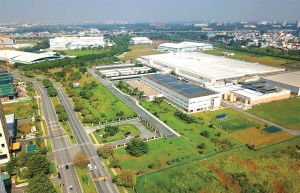The prospects in real estate M&A
That said, however, 2023 and beyond will present significant headwinds to growth and development in the global economy, and Vietnam’s real estate market specifically, brought about by an impending recession and reduced consumption in the key North American and European markets.
 |
| Meir Tlebalde-Head of Real Estate, KPMG Vietnam and Tran Duy Binh-Director of M&A, KPMG Vietnam |
Also to be considered are the continued conflict in Ukraine and its impact on an already unstable energy market, and China’s expected painful reopening process – the anticipated rise in pandemic-related cases and deaths will negatively impact consumption and production in the world’s second-biggest economy.
It is in this global context that Vietnam’s real estate market will face its own set of domestic challenges in the form of an uncertain regulatory environment – the much-anticipated revisions to the Law on Land has been further delayed and discussions are also afoot on a property tax to curb speculation, for example. There is also an unstable forex movement and the tightening of credit, coupled with increasing interest rates, which have dramatically driven down consumer demand and negatively affected real estate-related industries, such as construction material manufacturers.
Traditional funding sources such as the bond market are currently difficult to access, given the greater regulatory scrutiny stemming from recent high-profile cases in Vietnam’s real estate sector and bond market.
While there is certainly a sense of doom and gloom in the market, this illiquidity makes mergers and acquisitions (M&As) a winning formula for sellers desperate to access capital and a fruitful opportunity for foreign investors looking to enter or expand their presence in Vietnam, especially those with a mighty war chest to draw upon.
The important point to emphasise as to why M&A is the most effective solution to channel capital, whether in the real estate or other sectors, is that there are still many companies and private equity funds with significant money that needs to be deployed after two years of slowed investment.
The most common forms for sellers and investors to achieve their financial and commercial objectives in this situation would be via formation of a joint venture company or additional share subscription into the target company. The former is used predominantly where the domestic seller is sitting on land but lacks the capital or wherewithal to develop the project.
The seller would inject the land into the joint venture company as its charter/paid-in capital, while the foreign investor would inject cash. Additional funding via commercial banks or shareholders loans are available options, but the cost and regulatory requirements must be considered carefully.
A share subscription (and potentially including a share acquisition portion, depending on the contemplated deal structure), are popular in real estate projects that are more advanced in their development stage but have encountered capital issues. This presents a tremendous opportunity for a strategic investor to contribute additional capital at a more reasonable valuation.
For sellers, a mixed approach of a share sale and subscription would provide concrete benefits by allowing the existing shareholders to cash out a portion of their equity as recompense for the initial effort in getting the project off the ground, while the additional new money injection would enable the target company to proceed with further development.
A complete buyout would also be attractive to sellers looking to deleverage their positions vis-à-vis their banker overlords or wary bondholders, but foreign investors should take a realistic approach on whether they can navigate the regulatory landscape and pitfalls in Vietnam on their own if this is their first foray into the market.
 |
Maximising value
With this, it is worthwhile to understand the perspective of the domestic owner/developer and foreign investor to see why M&A is not only a necessity in some situations, but a win-win for both parties.
For certain owners who have maxed out their credit line and lack the cashflow to service their existing loans, M&A with a cash-rich partner might be the only lifeline available. Otherwise, their bank would enforce the mortgage over their shares or land (or both), either of which would leave the owner in the worst possible financial position.
To maximise value, however, owners should be keenly aware that investors, especially foreign ones, look beyond merely owning real estate assets or land, but are more interested in a sustainable operating platform and sophisticated management that can assist them to navigate and make inroads into new markets and develop new products.
Foreign investors bring with them decades of global experience and cash that needs to be deployed, meaning that they come with much higher expectations and requirements of their domestic partners.
Owners should also take a realistic approach to their valuation given the current economic climate and the frozen real estate market. While the adage of location, location, location holds true, owners should be aware that homebuyers have become more demanding and sophisticated.
The previous cookie-cutter approach, at least for high-end developments, would not attract buyers who demand greater design and construction quality, exceptional service and managements standards, smart living systems, diverse and integrated retail and commercial ecosystem, LEED certification, and other aspects. As such, M&A transactions are the best approach for owners to avail themselves of their partner’s experience and to access their financial resources.
From the investor’s perspective, Vietnam’s regulatory landscape possesses a set of unique challenges in the form of a complex (and sometimes contradictory) land and project registration and approval process. Moreover, the laws and regulations here are in a constant state of evolution that inject unpredictability and uncertainty into the decision-making process.
This is not to say that a foreign developer is incapable of implementing his own greenfield project (there are many successful projects that point to the contrary), but having a capable domestic partner allows both parties to apply their specific skill set and expertise to unlock much greater value together than they ordinarily would individually.
Hence, selecting the right partner with strong licensing capacities and a proven track record will shorten the project implementation timeline, ensuring capital is quickly deployed to generate positive cashflow. Sellers with clean land and projects ready for construction will certainly be able to demand a higher premium as compared to projects that merely exist on paper.
In this regard, due diligence of the target company and its projects is a critical step to identify issues and possible solutions; for every challenge, there is an opportunity. An investor with comprehensive information provided by capable and experienced advisors would not only be able to make an informed investment decision, but would also be able to unlock greater value based on market-specific information and insights.
 | Industrial property expansion supported by long-term goals As the economy retains a strong growth rate in 2023, the expansion potential of the industrial real estate market will continue to pique the interest of investors. |
 | Cash burden alleviation now called for The domestic real estate market is starting to recover, but it would benefit from more governmental assistance, such as softer bank loans and credit. |
 | Fresh trends to accumulate property in 2023 Investment trends could be shifting to the longer term to earn profits within the next 3-5 years, instead of more speculative investments. Trang Le, head of Research and Consulting at JLL Vietnam, told Hai Yen about accumulating real estate assets in 2023. |
What the stars mean:
★ Poor ★ ★ Promising ★★★ Good ★★★★ Very good ★★★★★ Exceptional
Related Contents
Latest News
More News
- Construction firms poised for growth on public investment and capital market support (February 11, 2026 | 11:38)
- Mitsubishi acquires Thuan An 1 residential development from PDR (February 09, 2026 | 08:00)
- Frasers Property and GELEX Infrastructure propose new joint venture (February 07, 2026 | 15:00)
- Sun Group led consortium selected as investor for new urban area (February 06, 2026 | 15:20)
- Vietnam breaks into Top 10 countries and regions for LEED outside the US (February 05, 2026 | 17:56)
- Fairmont opens first Vietnam property in Hanoi (February 04, 2026 | 16:09)
- Real estate investment trusts pivotal for long-term success (February 02, 2026 | 11:09)
- Dong Nai experiences shifting expectations and new industrial cycle (January 28, 2026 | 09:00)
- An Phat 5 Industrial Park targets ESG-driven investors in Hai Phong (January 26, 2026 | 08:30)
- Decree opens incentives for green urban development (January 24, 2026 | 11:18)

 Tag:
Tag:





















 Mobile Version
Mobile Version